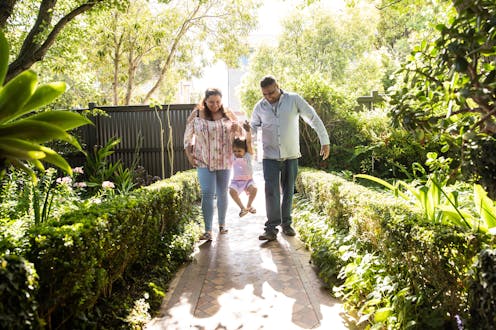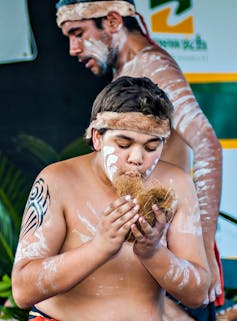
In New South Wales, as of June 2021, 42% of children in out-of-home care were Aboriginal and Torres Strait Islander children.
This stark over-representation has been the subject of multiple child welfare reviews, from Bringing them Home to Family is Culture.
The NSW parliament is now considering a bill, sponsored by Greens MP David Shoebridge, proposing crucial child protection reforms. The legislative assembly passed the bill in late February. Whether it passes the lower house in the coming weeks will be a test of the parliament’s commitment to reducing the number of Aboriginal and Torres Strait Islander children in out-of-home care.
The bill’s passage (or otherwise) will also lay bare the extent of the government’s resolve to address ongoing harms caused by generations of forced, systematic removals of Aboriginal children.
Findings of past reports
Inquiries such as Family is Culture have repeatedly identified three crucial policy changes needed to address the over-representation of Aboriginal and Torres Strait Islander children and families in child protection systems across Australia:
services must become transparent and accountable to Aboriginal and Torres Strait Islander families and communities
self-determination in service design and delivery is crucial to ensure culturally safe and trusted services that properly address the needs of families
proper funding and resourcing of services is needed to address the legacies of racist laws and policies, which have resulted in intergenerational trauma and poverty.
The NSW bill takes meaningful steps towards addressing recommendations for reform from the Family is Culture review. It does this through its acknowledgement of historical harms and the importance of Aboriginal family and cultural connections. The bill also aims to improve the child protection system’s accountability towards Aboriginal and Torres Strait Islander children, families and communities.
The bill increases legal protections for Aboriginal and Torres Strait Islander children and families at the different stages of their involvement with the child protection system.
What the bill proposes to do
Importantly, the bill clarifies the functions of the Aboriginal and Torres Strait Islander Child and Young Person Placement Principles. The purpose of these principles is to prioritise children’s placement within their own extended family, community and culture.
Yet, there are ongoing, serious problems with compliance with the principles. For instance, just under 50% of Aboriginal and Torres Strait Islander children in care in NSW are placed with non-Aboriginal carers.
The bill incorporates the five key elements of the principles, which provide clearer provisions for:
prevention of children’s separation from families, by providing supports that address underlying causes of child protection concerns
partnership with communities, through the involvement of community representatives in the design and delivery of services and in care decision-making
ensuring children and families participate in decisions about children’s placement
participation of children and young persons and their parents in all key decision-making concerning children’s care and protection
maintaining children’s connections with family, community, culture and country, when children are placed in out-of-home care.
The bill also includes important provisions regarding accountability. It requires the NSW Department of Communities and Justice make “active efforts” to support families to access culturally appropriate services, designed and delivered where possible by Aboriginal and Torres Strait Islander organisations.
Families can apply for a declaration from the Children’s Court of New South Wales that the department has failed to make active efforts. The minister must report such declarations to parliament, and also report on measures taken by the department to prevent children’s separation from their families.
Read more: Forgiveness requires more than just an apology. It requires action
Steps to help keep families together
Significantly, the bill responds to longstanding concerns about legislative amendments made in 2018, which set a maximum of 24 months for parents to address protective issues, or face permanent removal of their children.
The current bill increases these time frames, allowing parents up to 48 months to address broader protective issues, such as finding safe housing, escaping family violence or accessing services to support mental health and other concerns.

The bill also provides that the Children’s Court must give a representative of the relevant Aboriginal or Torres Strait Islander community the opportunity to be heard in individual care matters. Importantly, it introduces a rebuttable presumption that removing an Aboriginal or Torres Strait Islander child from their family causes harm. This means that there is a presumption that removal will cause harm unless evidence is presented to the contrary.
The Children’s Court must explain how it has considered this presumption when making care orders, and how it has considered other legal principles concerning Aboriginal and Torres Strait Islander children, including those regarding family and community organisations’ participation and the placement principles.
Future directions
The bill is not perfect. There remains a worrying lack of oversight for children who are permanently placed under the independent care of a guardian. The legislative assembly did not pass recommendations in Shoebridge’s original bill protecting Aboriginal children from being adopted. The assembly also did not pass Shoebridge’s recommendation prohibiting the accreditation of for-profit out-of-home care agencies and agencies that do not meet minimum standards.
However the bill provides a crucial opportunity. It represents an improved pathway to safety and stability for Aboriginal and Torres Strait Islander children who have been failed across decades of reforms.
Moreover, the bill provides measures with respect to accountability and supports for some of the most vulnerable children, which can and should be extended nationally.
Terri Libesman has nothing to disclose.
Eloise Chandler and Wendy Hermeston do not work for, consult, own shares in or receive funding from any company or organisation that would benefit from this article, and have disclosed no relevant affiliations beyond their academic appointment.
This article was originally published on The Conversation. Read the original article.







